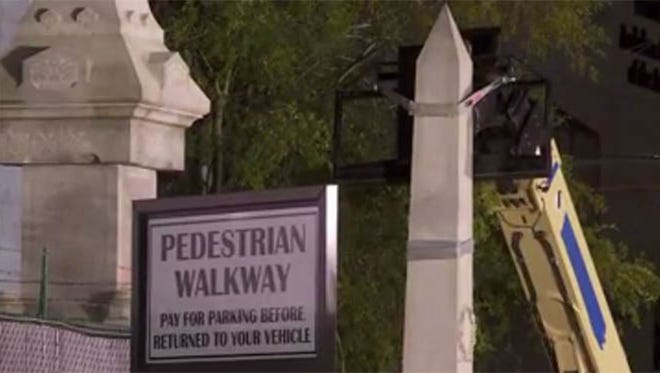New Orleans begins removing Confederate monuments

NEW ORLEANS — New Orleans began the process of taking down Confederate statutes early Monday with the removal of the monument to the Battle of Liberty Place. The city became the latest Southern jurisdiction to divorce itself from what some say are symbols of racism and intolerance but which opponents say are historic.
The Liberty Monument, which commemorates whites who tried to topple a biracial post-Civil War government in New Orleans, was taken away in pieces around 5:35 a.m. CT after a few hours of work.
“The removal of these statues sends a clear and unequivocal message to the people of New Orleans and the nation: New Orleans celebrates our diversity, inclusion and tolerance,” said Mayor Mitch Landrieu.
Related: Confederate flag flies next to NCAA arena in South Carolina
“Relocating these Confederate monuments is not about taking something away from someone else. This is not about politics, blame or retaliation. This is not a naïve quest to solve all our problems at once. This is about showing the whole world that we as a city and as a people are able to acknowledge, understand, reconcile — and most importantly— choose a better future. We can remember these divisive chapters in our history in a museum or other facility where they can be put in context — and that’s where these statues belong.”
Landrieu said the memorials were coming down during the early hours of the morning because of death threats and intimidation from some of those who want the monuments to stay and to minimize city disruption.
The crews used to remove the monuments wore masks and full body suits to protect their identity. As local media showed live video of the monument's removal, crews were asked to move so as not to show an angle that could reveal the identity of the workers removing the monument.
Related: Commission rejects plan to relocate Confederate statue
There was a small, but vocal, and mostly pro-monument group at the site.
Paul McIntyre, who said his great-grandfather's name was on the memorial, disputed the legacy afforded those whose names were on the obelisk.
"None of them owned slaves, none of them were fighting for slavery," he said. "In the documents you can access, it tells you it's over state's rights."

Another vigil by pro-monument groups was held at the Jefferson Davis statue. Many of those in attendance said the statues represented history.
Related: Confederate memorial at Ky. university to be removed
In a statement from the City, details regarding the removal of the statues of Confederate Generals Robert E. Lee and P.G.T. Beauregard and Confederate States of America President Jefferson Davis, will not be released to the public.
A City Hall spokesman earlier Sunday issued a statement that said the city is "committed to taking down the Confederate monuments" but would not say when.
"Due to the widely known intimidation, threats, and violence there remains serious safety concerns," the statement continued. "Therefore, we will not be sharing the details on removal timeline."
Nationally, the debate over Confederate symbols has become heated since nine parishioners were killed at a black church in South Carolina in June 2015. South Carolina removed the Confederate flag from its statehouse grounds in the weeks after, and several Southern cities have since considered removing monuments. The University of Mississippi took down its state flag because it includes the Confederate emblem.
New Orleans is a majority African-American city although the number of black residents has fallen since 2005's Hurricane Katrina drove many people from the city.
The majority black City Council in 2015 voted 6-1 to approve plans to take the statues down, but legal battles over their fate have prevented the removal until now, said Landrieu, who proposed the monuments' removal and rode to victory twice with overwhelming support from the city's black residents.
Contributing: The Associated Press. Follow WWL-TV on Twitter: @WWLTV